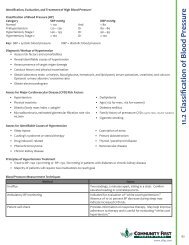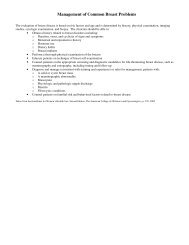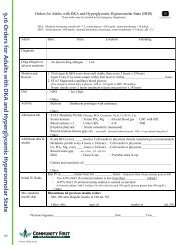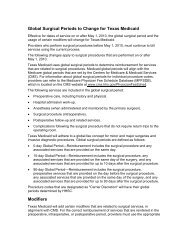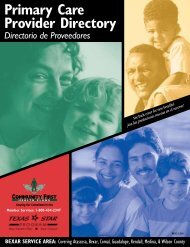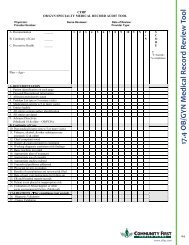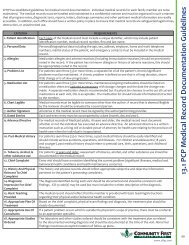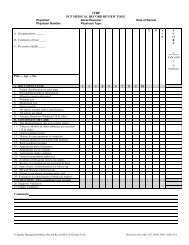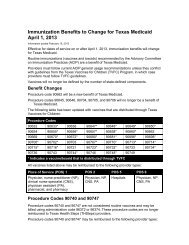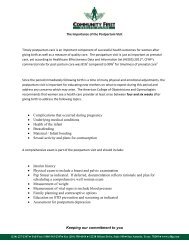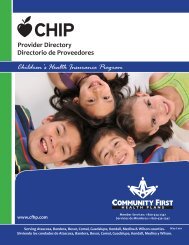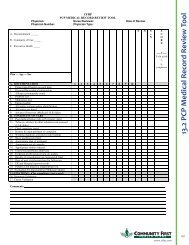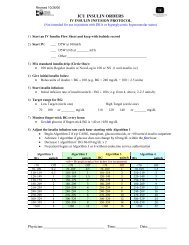Full Clinical Guidelines - Community First Health Plans.
Full Clinical Guidelines - Community First Health Plans.
Full Clinical Guidelines - Community First Health Plans.
You also want an ePaper? Increase the reach of your titles
YUMPU automatically turns print PDFs into web optimized ePapers that Google loves.
.<br />
aminotransferase (AST) and alanine aminotransferase (ALT), fasting glucose<br />
iii. greater than the 95th percentile, even in the absence of risk factors: all of the tests listed under ii., plus blood urea<br />
nitrogen (BUN) and creatinine<br />
<strong>Guidelines</strong> for laboratory assessment and testing are also provided for more detailed evaluation, typically performed and<br />
interpreted by subspecialists (see Assessment Report and Table 9 in that report)<br />
TREATMENT RECOMMENDATIONS<br />
1. The Expert Committee recommends that all physicians and healthcare providers should address weight management and<br />
lifestyle issues with all patients regardless of presenting weight, at a minimum, each year.<br />
2. The Expert Committee recommends that all children between 2 and 18 years of age with BMI between the 5th and 84th<br />
percentile should follow the recommendations for prevention as outlined in the Prevention Report.<br />
3. The Expert Committee recommends that the treatment of overweight children be approached in a staged method based<br />
upon the child’s age, BMI, any related comorbidities, weight status of parents, and progress in treatment, and that the<br />
child’s primary caregivers/families be involved in the process.<br />
4. The Expert Committee recommends the following staged approach for children between the ages of 2 and 19 years and<br />
whose BMI is above the 85th percentile:<br />
STAGE 1. PREVENTION PLUS PROTOCOL<br />
These recommendations can be implemented by the primary care physician or allied healthcare provider who has some training<br />
in pediatric weight management/behavioral counseling.<br />
Stage 1 recommendations include:<br />
I. Dietary habits and physical activity:<br />
1. Five or more servings of fruits and vegetables per day<br />
2. Two or fewer hours of screen time per day, and no television in the room where the child sleeps<br />
3. One hour or more of daily physical activity<br />
4. No sugar-sweetened beverages<br />
II. Patients and families of the patient be counseled to facilitate these eating behaviors:<br />
1. Eating a daily breakfast<br />
2. Limiting meals outside of the home<br />
3. Family meals should happen at least 5-6 times per week<br />
4. Allowing the child to self-regulate his or her meals and avoiding overly restrictive behaviors<br />
III. Within this category, the goal should be weight maintenance with growth that results in a decreasing BMI as age increases.<br />
Monthly follow-up.<br />
IV. After 3-6 months, if no improvement in BMI/weight status has been noted, advancement to Stage 2 is indicated and based<br />
on patient/family readiness to change.<br />
STAGE 2. STRUCTURED WEIGHT MANAGEMENT PROTOCOL<br />
These recommendations can be implemented by a primary care physician or allied healthcare provider highly trained in weight<br />
management. Stage 2 recommendations include:<br />
I. Dietary and physical activity behaviors;<br />
1. Development of a plan for utilization of a balanced macronutrient diet emphasizing low amounts of energy-dense foods<br />
2. Increased structured daily meals and snacks<br />
3. Supervised active play of at least 60 minutes per day<br />
4. Screen time of 1 hour or less per day<br />
II. Increased monitoring (eg, screen time, physical activity, dietary intake, restaurant logs) by provider, patient and/or family<br />
within this category, goal should be weight maintenance that results in a decreasing BMI as age and height increases;<br />
however, weight loss should not exceed 1 lb/month in children aged 2-11 years, or an average of 2 lb/wk in older overweight/<br />
obese children and adolescents.<br />
III. If no improvement in BMI/weight after 3-6 months, patient should be advanced to Stage 3<br />
STAGE 3. COMPREHENSIVE MULTIDISCIPLINARY PROTOCOL<br />
At this level of intervention, the patient should optimally be referred to a multidisciplinary obesity care team.<br />
I. Eating and activity goals are the same as in Stage 2<br />
II. Activities within this category should also include:<br />
1. Structured behavioral modification program, including food and activity monitoring and development of short-term diet<br />
and physical activity goals<br />
2. Involvement of primary caregivers/families for behavioral modification in children under age 12 years and training of<br />
primary caregivers/families for all children<br />
H EALTH PLANS<br />
www.cfhp.com<br />
155



